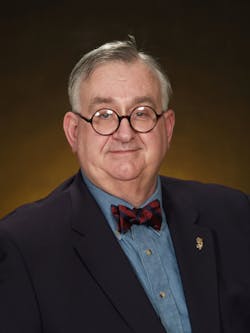Is it just me, or do I see many things in our world that seem to be on the verge of coming apart? In the long-ago childhood of my Eisenhower-years upbringing, several important concepts were installed into my psyche. Maybe these things were done by my parents. Maybe it was my grandmother. Or perhaps it was an influence whose origins have escaped me over the decades of my life.
Let me now suggest that they may have come from the time I spent learning about the Lord at St. Peter’s Episcopal Church in Freehold, NJ. Possibly they came from my time at the West Freehold School or Boy Scout Troop 155. Who can say? Perhaps all these different influences played a part. But installed they were, nonetheless. Much like Popeye the Sailor, “I am what I am.”
My growth and maturation experiences have taught me that people were supposed to be civil with one another. Polite boys and girls always said “please” and “thank you.” Ideas were made for sharing. You could not always get what you wanted. Not everyone was picked for the ball team. Sometimes you won and sometimes you lost.
Do unto others…
A critical concept revolves around the thought that things worked best when people came together, shared their thoughts, and then worked with others to create a consensus as to how things should work. Compromise was lauded as an important strength, one which was to be emulated by all truly thoughtful people. Business dealings were built in this way by people who came together in an honest way to reach a common ground upon which to build their lives.
These important, interpersonal attributes have long been a part of my personal approach to interacting with other people. I discovered a long time ago that an understanding of these basic aspects of life, when combined with a generous sprinkling of the “ … do onto others as you would have them do unto you,” aspects of the Golden Rule laid the groundwork for some pretty neat human interactions.
Some of my most enduring friendships were found upon the solid rock of these principles. Joe Youssouf, my long-time attorney (and high school football teammate) and I recently celebrated 57 years of friendship. We have frequently discussed the changes we have witnessed with the passing of the years.
We have spoken of those with whom we still interacted and shared some memories of those who have passed on. We noted a great many changes. Some appeared to be for the better, but many seemed to tilt in the direction of not so good. Our observations fueled a recent discussion on the state of our nation.
We spoke about how the various parts of government in our nation are now in the midst of a continual battle over how to run our nation’s government. It would seem to me that compromise is a concept that has been locked away in the bowels of a deeply divided Washington, DC. The left is fighting with the left. The right is fighting with the right. And anyone who seeks to reach across the divide between the parties is being smacked about. I see bad things happening.
Unfortunately, I see a great many other troubling behaviors that seem to have trumped my life’s experience as I move through the midst of my seventh decade here on earth. As I watch the news on my television or read about it in the newspaper, (yes, I still read newspapers) I see many disquieting reminders of the changes that are attacking the America in which I grew to adulthood. And if our societal framework is being attacked, so too must the fabric of our fire service be also at risk.
Hitting home
How does this affect your fire department? Let me suggest that you are being impacted on many levels. There are places where the lack of government support has created a great deal of negativity in your world. Just look at the problems facing the Houston Fire Department. If you need information on what has been happening, visit firehouse.com/21084553.
My friends, this is yet another example of the “show me the money” mentality of far too many within the thousands of local government bodies here in the United States. I am also willing to bet that our friends in Canada are facing the same problems. Who knows, maybe it is a worldwide problem.
Your job as a chief fire officer is to work to ensure that the problems with government do not bleed into your department and cause problems between and among the members of your department. I am well aware of how this can happen, based upon my 26 years with the Newark, NJ, Fire Department.
The battles between our fire officer’s union (and the firefighters union) ebbed and flowed depending up the time and place involved. I want you to know that it is my belief that the city wanted to pay us as little as they could get away with doing. Thank the Lord that we had our union working on the behalf of our members. We had our good years and we had our not so good years.
My job as a field battalion chief was to create a team that would allow us to accomplish what we needed to do at any given moment. I could not control how the city treated us as a group. However, I could control how I interacted with my folks. I always felt that by caring for my gang, I would create a happier group of people who would be better able to do what had to be done.
As I read the latest leadership texts, I see a certain ebb and flow of the classic ideas of leadership. There are literally thousands of books about how to lead people. My approach has always been the same. If you take care of your people, they will take care of you.
Many of my problems as a volunteer fire chief came from the fact that I showed a lack of respect to certain people. I was unable to hide the fact that I did not like them. And this lack of deference to these folks led to others joining with them against me.
I really thought I was the same person in both my career and my volunteer roles. History showed me that I wasn’t. In Newark, I was perceived as a servant leader; one who always took care of the troops. In Adelphia, it seems that I was seen as an overbearing dumbass who continually harassed his fellow fire people.
It took me a number of years to come to this critical observation on my own. I would urge all of you to spend time thinking about who you are and what you do. Do not rely solely on your own perceptions of yourself. Ask others what they think. Pay attention to them and heed their advice. They were kind enough to share their feelings with you. Please use their advice.
Peacekeeper
Regardless of whether you are a career, volunteer, combination, military, or industrial fire department, one of your primary tasks as a leader is to head off the creation of subgroups (or cliques), which can begin to break your department into a series of warring factions.
It is critical that you have the capability to bring people together around a table to conduct discussions regarding the who, what, when, where, why and how of how your department operates. If you ask for suggestions, listen carefully and take notes. If you conduct a brainstorming session, do not cut off the discussion or suggest that any given solution is stupid.
There are no dumb ideas at the brainstorming level. Some really bad initial suggestions have led to some great organizational changes because people were willing to listen, share and compromise on the direction they wished to travel. I have seen this at work many times. You need to be sure that you include this particular tool in your overall toolbag of leadership skills and capabilities. You need to work at this.
I would suggest to you that you have a minimal ability (and probability) of influencing the national debate we are seeing between the left and the right. What I would equally suggest is that you not only have the ability to influence change in your fire department, but that you have the responsibility to do this.
If not you, who? Maybe you cannot influence the entire fire department, but you can have an impact upon your part of it. Let me also suggest that the success of your part of the fire department can lead other parts to follow your example.
Maybe you cannot run the entire show. However, I want to tell you that it is critical to do the best with that part with which you have been entrusted. Good luck on your journey.
About the Author

Dr. Harry Carter
HARRY R. CARTER, Ph.D., who is a Firehouse contributing editor, is a fire protection consultant based in Adelphia, NJ. He is chairman of the Board of Commissioners in Howell Township Fire District 2 and retired from the Newark, NJ, Fire Department as a battalion commander. Carter has been a member of the Adelphia Fire Company since 1971, serving as chief in 1991. He is a life member and past president of the International Society of Fire Service Instructors and life member of the NFPA. He is the immediate past president of the U.S. branch of the Institution of Fire Engineers (IFE) of Great Britain. Carter holds a Ph.D. in organization and management from Capella University in Minneapolis, MN.
Connect with Harry:
Email: [email protected]
